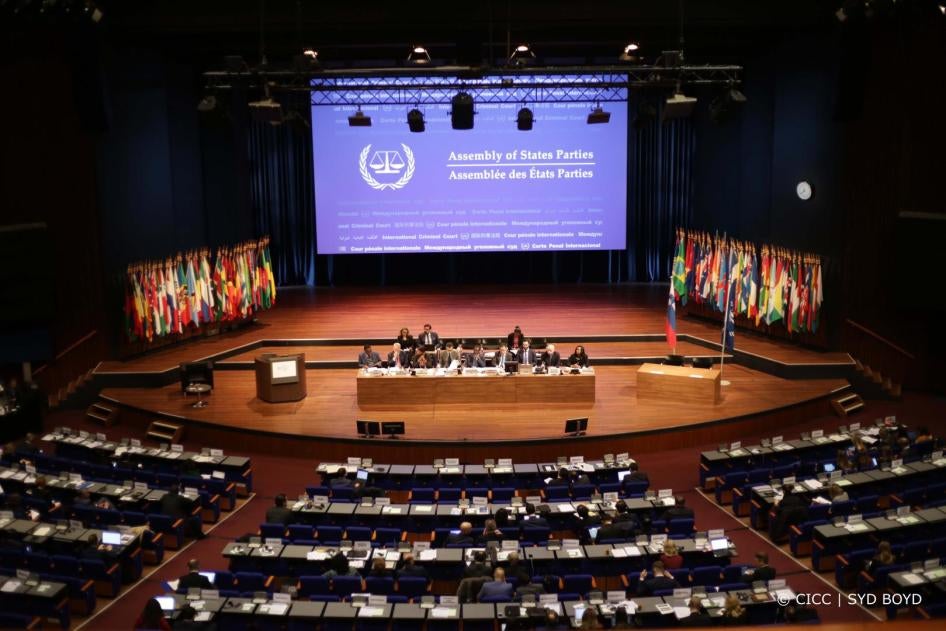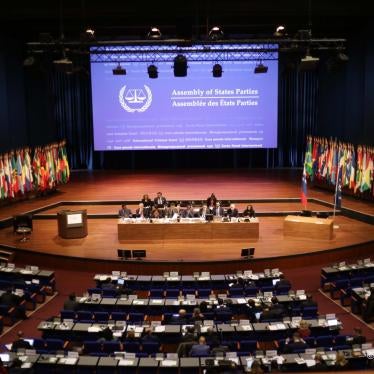(The Hague) – Member countries of the International Criminal Court (ICC) should make a commitment at their annual meeting to provide consistent financial, political, and practical support for justice, Human Rights Watch said today. The 21st session of the ICC’s Assembly of States Parties will take place in The Hague from December 5 to 10, 2022.
Twenty years after the court’s founding, the ICC prosecutor’s opening of an investigation in Ukraine following Russia’s full-scale invasion in February has brought renewed attention to the court’s work in bringing justice to victims of serious international crimes. With accountability in the spotlight, member countries will have the opportunity through their decisions at the session, including in setting the court’s annual budget, to ensure the court is equipped to work across its full mandate, avoiding damaging perceptions of double standards in victims’ access to justice.
“The serious international crimes being committed in Ukraine and elsewhere demonstrate once again the importance of the ICC’s promise of accountability and the court’s crucial role,” said Liz Evenson, international justice director at Human Rights Watch. “For the victims and survivors from across the globe seeking justice from the ICC, member countries should back up their commitments with the budget the court needs to do its job.”
Years of holding down budget increases to a bare minimum as some member countries insisted on a zero nominal growth approach has left the court without the resources it needs to support its work across the many situations it has made commitments to address.
In advance of the session, Human Rights Watch issued a 30-page report making recommendations to ICC member countries. There is a wide gap between the court’s workload and its annual budget, set at €151 million (US$156 million)in 2022. During 2022, in addition to Ukraine, the prosecutor has sought to move forward investigations in the Philippines and Venezuela, and has received authorization to resume an Afghanistan investigation.
In addition, the court delivered three arrest warrants in Georgia, and the prosecutor submitted requests for additional arrest warrants in the Libya situation, while also seeking to move pre-trial proceedings forward in absentia for the first time, against Joseph Kony, the leader of the Ugandan rebel group, the Lord’s Resistance Army.
Earlier in 2022, the ICC prosecutor called for voluntary contributions and seconded personnel to support the office’s work. Many ICC member countries enthusiastically provided support, but it served effectively to acknowledge that the court does not have the resources in its regular budget to fulfill its mandate. Some countries have publicly linked their contributions to support for the Ukraine investigation, although earmarking contributions is not permitted in the court’s regulatory framework. For justice delivered by the court to be legitimate, it is important that it is not perceived to be driven by the preferences of individual member countries, nor overly selective due to resource constraints, Human Rights Watch said.
During the annual meeting, member countries will also address the extensive 2020 review by independent experts of the court’s performance. Since the experts reported on their findings in September 2020, member countries and the court, together with civil society groups, have been assessing their nearly 400 recommendations.
While the work of assessing these recommendations nears completion, carrying them out will most likely continue for several years. To build on progress to date, at the upcoming session, member countries should renew for a limited period the mandate of the Assembly of States Parties body charged with overseeing the review, Human Rights Watch said. That body, known as the Review Mechanism, should develop a plan to ensure that the court’s delivery of justice remains on the assembly’s agenda, while protecting prosecutorial and judicial independence and providing for the participation of civil society groups.
Earlier in 2022, member countries adopted a strategy to carry out the expert review’s recommendation on countering politicized opposition to the ICC’s work, capturing lessons learned from addressing punitive sanctions aimed at the court by the previous United States administration. To put this strategy into action, member countries should speak up during the assembly session about the importance of building on past successful practices to counter attacks on the court and to using the strategy to address threats to human rights defenders. The government of Israel has outlawed six prominent Palestinian civil society organizations, several of which have been submitting information to the ICC about alleged crimes committed by Israeli forces, and raided their offices. These actions have been internationally condemned.
Several important elections of ICC officials are slated for 2023. Member countries will elect six new judges, while the court’s judges will elect its next registrar. Member countries agreed in 2021 to put in place a permanent vetting process for “high moral character” for all elected ICC officials by their 2023 session. A due diligence process aimed at ensuring that candidates are of “high moral character” was put in place for the registrar election, and at this session, member countries should ensure they advance discussion of a dedicated vetting process for the upcoming judicial elections in 2023, Human Rights Watch said.
“The ICC will never be able to do everything it needs to do, but in recent years inadequate resources have significantly limited the court’s contributions to justice,” Evenson said. “This year, the strongest political message ICC member countries can send to ensure that no one is above the law is to give the court the budget it needs to fully pursue its mandate globally.”








